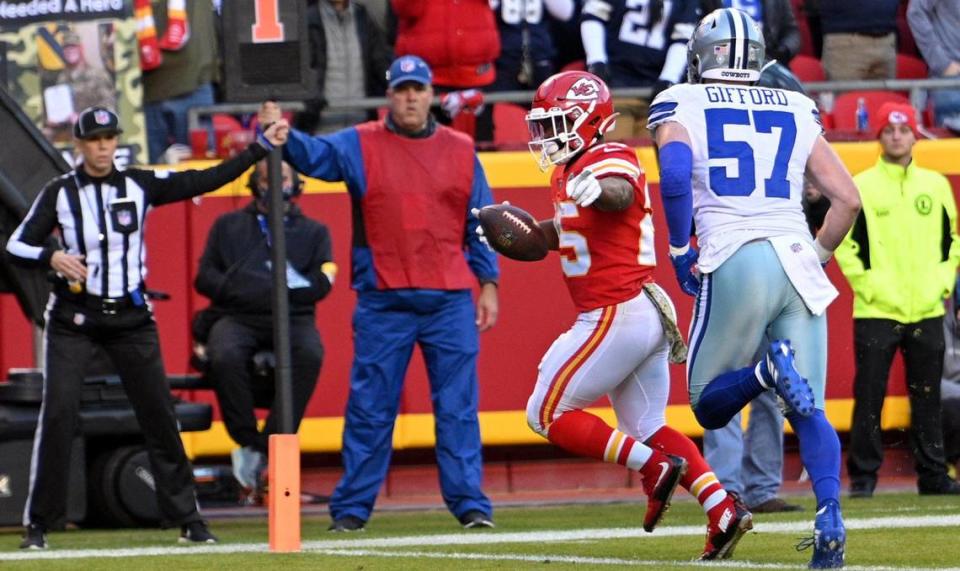No fun league? Here’s what KC Chiefs’ Bieniemy tells players about anti-taunting rules

By the time Clyde Edwards-Helaire returned to the Chiefs’ sideline, he knew what to expect, and whom to expect it from.
Edwards-Helaire had just run for a touchdown against the Dallas Cowboys, but then came a taunting flag — merely for pointing at an opposing linebacker as he crossed the goal line. And as harmless as the action might have seemed, that’s precisely the type of thing that’s sure to garner an earful from offensive coordinator Eric Bieniemy.
Edwards-Helaire’s teammates were well aware too, so they beat Bieniemy to the punch. As Bieniemy predictably approached Edwards-Helaire, quarterback Patrick Mahomes and a few teammates cut him off.
“Obviously Clyde knew that he probably shouldn’t have done it — there’s really a high emphasis on the taunting right now,” Mahomes said. “(Bieniemy) came over there, and Clyde already knew, but he started getting mad, so we started hyping him up and it made him laugh. It’s hard to break him whenever he’s in those moods.”
Ten days later, the point stands:
Can’t happen.
The Chiefs were forced to kick a 48-yard extra point. And Edwards-Helaire’s bank account is a bit lighter after a fine from the league.
After an offseason in which NFL sought to emphasize ridding the sport of taunting, which it considers disrespectful — an assertion to which the players’ union has agreed, by the way — Edwards-Helaire’s simple pointing gesture elicited an example of the kind of penalties the league is imposing now.
Is this really necessary? The rule has been blasted by fans — the “No Fun League” moniker has returned — and individual players have voiced their displeasure.
That, of course, is not the piece of the story on which Bieniemy is focusing — because it’s not the piece of the story the Chiefs can control.
“The thing that we stress to our guys (is that) this is a point of emphasis, so regardless of what you might seem to think that it’s harmless, that’s not the case anymore,” Bieniemy said. “We need to go back to the days of just handing the ball to the ref — get in the end zone, celebrate with your guys, and then we go on from there.”
It presents a bit of conundrum for the Chiefs in particular. Head coach Andy Reid has long been a proponent of players “showing their personalities” on the field. The Chiefs have recently talked about getting their swagger back.
This is part of it.
“I showed my personality. We’ve talked about it — being me and playing football,” Edwards-Helaire said. “That’s just what it is.”
The rule — or its emphasis — is here to stay. Just two weeks ago, with a memo, the NFL reminded teams that it will continue to flag taunting in hopes that players will eventually make the adjustment.
According to ESPN Stats & Information, there were more taunting flags in the first 10 weeks of the season than any other season tracked since 2000.
All a product of an offseason meeting and agreement between the NFL Players Association, coaches and the league’s competition committee.
“Overall I think the emphasis on the taunting has been a positive,” Chiefs CEO and chairman Clark Hunt said. “It’s one of those things where when you look at it from afar, it’s an easy thing to support not doing.
“The players as a whole — the players union — have been very supportive of it. When it happens to you — when you get a flag on it on a week-to-week basis — you tend to have a little bit of a different perspective on it and a lot of times don’t feel the call was appropriate. But that’s the nature of probably a lot of NFL penalties, as well.”

 Yahoo Finance
Yahoo Finance 